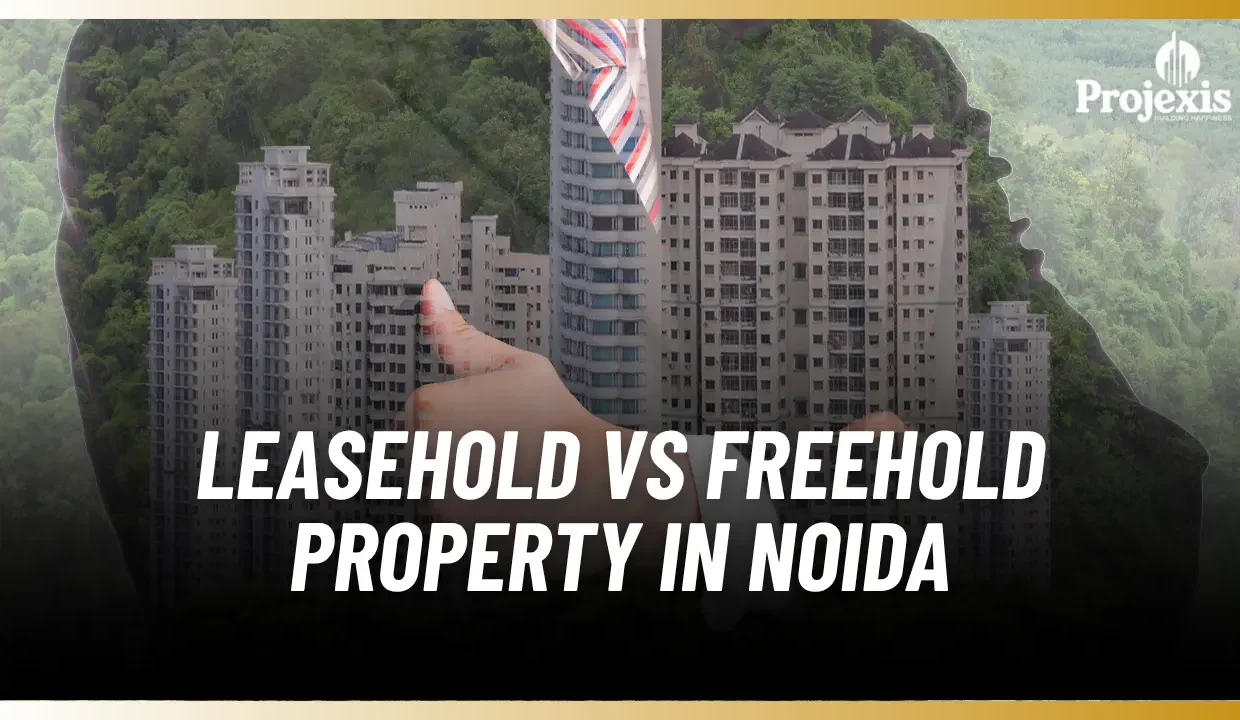
When buying a property in Noida, one of the most common questions homebuyers face is: What’s the difference between leasehold and freehold property? This distinction plays a major role in determining your ownership rights, resale potential, and long-term investment value.
In this article, we’ll break down everything you need to know about leasehold vs freehold property, especially in the context of Noida’s real estate market. Whether you’re purchasing a flat, plot, or commercial space, understanding this difference can save you from future legal and financial complications.
What Is a Freehold Property?
A freehold property means the buyer has complete ownership of both the land and the structure built on it. There is no time limit on ownership, and you have full rights to sell, transfer, lease, or modify the property, subject to local building regulations.
In Noida, freehold properties are generally preferred by buyers because they provide more flexibility, security, and control. Once registered, the property is entirely yours, with no dependence on any authority for lease renewals.
Key features of freehold properties:
Full ownership of land and building
No renewal or lease charges
Easier resale and transfer process
Higher property appreciation value
Suitable for long-term investment
What Is a Leasehold Property?
A leasehold property means you own the property (the structure or apartment), but not the land it stands on. The land remains under the ownership of a government authority or private developer, and the lease is typically valid for a fixed term — commonly 30, 60, 90, or 99 years.
In Noida, many properties—especially those allotted by the Noida Authority—are leasehold in nature. Once the lease period ends, the ownership reverts to the authority unless it is renewed by paying the applicable lease rent.
Key features of leasehold properties:
Ownership limited to the structure, not the land
Fixed lease tenure (usually 99 years)
Requires renewal after lease expiry
Transfer needs authority approval
Slightly lower resale value compared to freehold
Leasehold vs Freehold Property: The Legal Difference
The core legal distinction between leasehold vs freehold property lies in ownership rights.
| Parameter | Leasehold Property | Freehold Property |
|---|---|---|
Ownership | Land belongs to authority; buyer owns structure only | Buyer owns both land and structure |
| Tenure | Limited (30–99 years) | Perpetual |
| Renewal Requirement | Yes, after lease term ends | Not applicable |
| Authority Involvement | Required for transfer, mortgage, or redevelopment | Not required |
| Resale Value | Lower resale value | Higher resale and appreciation |
| Investment Security | Moderate | High |
| Bank Loan Approvals | Subject to authority NOC | Easier and quicker approvals |
Understanding these distinctions helps you make a more informed decision before purchasing property in Noida.
Why Are Many Noida Properties Leasehold?
Unlike Delhi, where freehold conversions have been common, Noida’s land belongs to the Noida Authority, a government body responsible for development and allotment. Hence, most residential and commercial plots are leased to developers for 90 years, who then sell flats to buyers under a sub-lease model.
This means if you buy a flat in a society built on leasehold land, your ownership is valid for the remaining lease tenure. However, the government allows conversion of leasehold properties into freehold, which can enhance ownership rights and resale value.
Pros and Cons: Leasehold vs Freehold Property
Advantages of Freehold Property
Complete ownership without renewal worries
High resale value and appreciation
No restrictions from authority for transfer or modification
Easier loan approvals from banks
Disadvantages of Freehold Property
Higher upfront cost
Limited availability in prime Noida sectors
Advantages of Leasehold Property
Lower purchase cost
Properties available in prime localities (like Sector 62, 63, 18, etc.)
Disadvantages of Leasehold Property
Limited ownership period
Requires authority permission for transfer
Renewal charges after lease term ends
Investment Perspective: Which Is Better in Noida?
When it comes to leasehold vs freehold property, your choice depends on your investment horizon and budget.
If you are looking for long-term ownership or want to pass the property to future generations, freehold is the better option. It offers full rights, better resale value, and freedom from authority approvals.
However, if you are an investor or short-term buyer seeking affordable property in prime areas, leasehold properties can be a smart option—especially when developers offer modern amenities and infrastructure.
Moreover, since Noida Authority allows leasehold-to-freehold conversion, leasehold properties still remain a viable choice for buyers who want to secure their ownership in the future.
Tips for Buyers: Choosing Between Leasehold and Freehold Property
Always verify ownership documents before purchase.
Check whether the land is under Noida Authority or private ownership.
Review the remaining lease tenure in case of leasehold.
For investment, prefer projects with a clear conversion option.
Consult a reputed real estate consultant like Projexis for guidance and documentation assistance.
Conclusion
Both leasehold and freehold properties have their own advantages and limitations. The right choice depends on your long-term goals, budget, and risk appetite.
In Noida’s dynamic real estate market, understanding leasehold vs freehold property is essential for making an informed and profitable decision. If you are looking to buy a residential or commercial property in Noida, contact Projexis, a trusted real estate consultancy known for expert guidance, transparent deals, and verified projects.
Contact Projexis:
Office Address: Chandra Heights, Plot No. 694M–696M, Main Dadri Road, Sector 107, Noida, UP – 201304
Contact Number: +91 9716232323
FAQs: Leasehold vs Freehold Property
A leasehold property is owned for a fixed period (like 99 years), while freehold property gives complete ownership of the land and structure.
Freehold properties offer better long-term value, while leasehold properties are more affordable for short-term investment.
Yes, most banks provide loans for approved leasehold projects with sufficient lease tenure remaining.
Slightly, as the lease tenure reduces, but value can be maintained through renewal or conversion to freehold.
